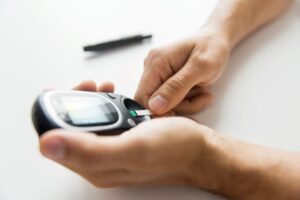
Type 2 diabetes is a complex metabolic condition that, if not properly managed, can cause widespread damage to the body’s cells. If you have this condition, you may be trying to control it via diet and exercise, both of which are extremely important! But did you know that the quality of your sleep can also affect your diabetes? This blog post delves into the relationship between sleep apnea and blood glucose levels.
Sleep Apnea and Blood Glucose
Sleep apnea is a disorder that causes multiple cessations in breathing during sleep. These episodes, known as apneas, can deprive your body of oxygen and increase the amount of carbon dioxide in your body. In turn, that can interfere with how your hormones work. Specifically, it can increase insulin resistance.
Insulin is the hormone that helps to move sugar from your blood into your cells. Type 2 diabetes is essentially a form of severe insulin resistance. In other words, it prevents your body from using insulin as efficiently as it should, leading to higher blood glucose levels and a higher A1C. Sleep apnea exacerbates the problem.
Sleep Apnea and Other Health Conditions
Diabetics are already at a heightened risk of high blood pressure, heart disease, and stroke. It is also common for individuals with type 2 diabetes to be obese, and carrying extra body fat is another major risk factor for heart problems. Obesity, diabetes, and sleep apnea can create a “perfect storm” of conditions that put your overall wellness in serious jeopardy.
What Can You Do?
The above information might sound pretty dire, but the good news is that there are practical steps you can take to improve the quality of your sleep and enjoy improved health.
- Seek sleep apnea treatment. Several treatments are available that can prevent apneas and promote high-quality breathing during sleep. For example, you might qualify for the Vivos DNA appliance, which can widen the upper airway and produce long-term improvements in breathing.
- Consider a reasonable weight loss plan. If you are carrying some extra weight, do your best to shed some of it. Do not put pressure on yourself to stick to an extreme diet so you can “get skinny.” Often, even modest weight loss contributes to significant improvements in both diabetes and sleep apnea.
- Make other lifestyle changes. Many healthy habits can positively affect both diabetes and sleep apnea. For example, quitting smoking and managing your stress levels can be highly beneficial.
Poor quality sleep can make it more challenging to keep your type 2 diabetes under control! Work with your medical team to manage both your nighttime rest and your blood glucose levels.
Meet the Practice
Exceptional Dentistry Pain & Sleep Solutions is proud to be the home of three talented sleep dentists, all of whom are well-qualified to help patients with obstructive sleep apnea achieve higher-quality rest. If you believe you have sleep apnea, or you are ready to learn more about your treatment options, we would be pleased to consult with you. Contact our Silver Spring, MD, office at 301-460-3331.
